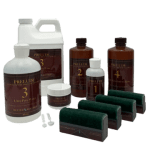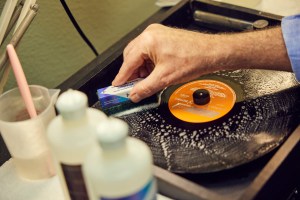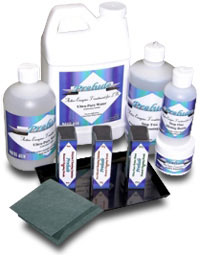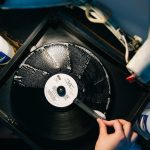
Someone used to sit in this room all day, running the records through our proprietary multi-step cleaning process.
(Now our record cleaning person has a nice big room in an office complex to sit in.)
Every Hot Stamper pressing has been vacuum cleaned on multiple machines using the Walker Enzyme system.
Walker Audio Prelude is the only fluid we recommend for serious sound enhancement and cleaning of your LPs. You have never heard what’s really in the grooves of your records until you’ve cleaned them using Walker’s system. There is nothing in our experience that works remotely as well.
We’ve also tried a number of “single step” record cleaning fluids and found that none were satisfactory. Disc Doctor is two steps, Walker is three (or four depending on whether you choose to use their new final rinse. At this time we do not). If you can’t see yourself using a three step cleaning process — no matter how much better it makes your records sound — then stick with Disc Doctor. You are sacrificing a great deal of sound quality this way, but the choice is yours.
 For cheap records alcohol and water are fine.
For cheap records alcohol and water are fine.
Cleaning Hot Stampers
We here at Better Records believe it’s virtually impossible to make meaningful comparisons among used or new (!) records that have not been properly cleaned. We have this fact thrown in our faces on a near daily basis, as so-so record after so-so record reveals layer upon layer of magic in its grooves after a good cleaning.
In 2007 we purchased an Odyssey RCM MKV Cleaning Machine. At about $8000 it’s an excellent machine if money is not at issue. We still use our VPI machine in the early stages of our cleaning process.
Every record that we play in our Hot Stamper shootouts is first scrubbed on the 16.5 with Walker Enzyme fluid and then vacuumed with the Odyssey. Our cleaning regimen involves multiple stages and processes, some of which we have never revealed, nor do we have any plans to do so. It took us about ten years to get to where we are with record cleaning and it gives us a big sonic advantage over everyone who hasn’t developed the methods that work so well for us.
The Keith Monks style machines should work just as well as the Odyssey. Others with the thread design they pioneered will too. If you want to make your records sound better, you need a machine of this design.
Ultrasonic Cleaning (Old Version)
We have not experimented with Ultrasonic cleaning, although we have heard good things about it from our audiophile friends and customers. It is simply not practical at this time to clean records the way we do — three steps of Walker fluids — and then add the additional steps required to bathe them in ultrasonic fluid and dry them. Our full-time record cleaning person can hardly keep up with the demands we make on her these days, what with shootouts going on five days a week. Making the cleaning process more time consuming is just not in the cards for the time being.
Ultrasonic Cleaning (UPDATE 2016)
We have now tried ultrasonic cleaning and are unable to see — read: hear — any benefit relative to the cleaning regimen that we have evolved over the last fifteen years of so.
Our take is simply this: No doubt it is better than nothing. It may be better than the VPI 16.5, or it might be better in conjunction with the 16.5. We leave it for others to determine how well any of these other approaches work.
The system described above does a dramatically better job than any other we have tested. It may not be cheap, but it really works, and it is worth every penny and every hour of what it costs in time and money.
Walker Step Two
We think using the Step Two fluid in the final stage before rinsing has a clearly audible benefit regardless of how the record has been cleaned previously.. We no longer sell record cleaning machines or fluid, so your best bet is to contact someone who does and give it a try. No Hot Stamper record leaves here without having been cleaned with Step Two.
Recleaning Hot Stampers
We don’t recommend it unless you can rinse them with the water we recommend below and use the Walker Step 2 for the final stage. Any other process will probably result in a loss of sound quality. It’s your record, do what you want with it, but don’t expect it to sound as good after you’ve recleaned it.
Rinse Water
We’ve had very good results with reverse osmosis water. It is audibly superior to everything else we’ve tried. We’re not saying it’s the best rinse water on the planet; we’re simply saying it’s the best we’ve heard. For a couple hundred bucks, having a reverse osmosis water system installed in your house will turn out to be money well spent if you are cleaning a large collection.
Aquarium stores sell it by the gallon if you don’t plan on cleaning enough records to justify the expense of installing a unit.
Play Them Through
We also have a series of turntables set up in the cleaning room that play through every record we’ve cleaned before it goes into the Hot Stamper shootout rotation. We recommend that you play your records at least once and as many as three times through before critically listening to them. Playing previously cleaned records plows loosened grunge out of the grooves and helps the cartridge “seat” itself in the dead center of the groove at the same time. Two or three plays usually does the trick, resulting in a clearly audible improvement of surfaces and sonics.
Anti-Static Devices
We don’t use them. For whatever reason static is never a problem on our turntable.
Further Reading
(more…)
 Prelude Record Cleaning System Available Now
Prelude Record Cleaning System Available Now

 Record Cleaning – An Overview
Record Cleaning – An Overview

 For cheap records alcohol and water are fine.
For cheap records alcohol and water are fine.